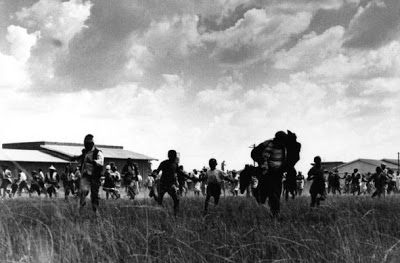Young people lie dead in the street in South Africa’s Sharpeville.
On the 21st of March 1960, the South African Apartheid police opened fire on black protesters. At least 180 black Africans, most of them women and children, were injured and 69 people were killed. Many people were shot in the back as they fled from the scene.
 The demonstrators at Sharpeville were protesting against the Pass Book law. The Pass Book law was a controversial law that limited the freedom of individuals and allowed the police to control the people’s whereabouts. A Pass Book had to contain a person’s photograph and stamps providing official proof that the person was granted permission to be in an area they were seen. The Pass Book also provided personal information such as the place of birth, tax payments, criminal records and employment records. It was like a passport only it was designed to keep people oppressed.
The demonstrators at Sharpeville were protesting against the Pass Book law. The Pass Book law was a controversial law that limited the freedom of individuals and allowed the police to control the people’s whereabouts. A Pass Book had to contain a person’s photograph and stamps providing official proof that the person was granted permission to be in an area they were seen. The Pass Book also provided personal information such as the place of birth, tax payments, criminal records and employment records. It was like a passport only it was designed to keep people oppressed.
Right after this insane and atrocious act the Regime cracked down all internal opposition and arrested thousands of black activists. Black political organizations were banned. This prompts the ANC and the PAC to pick up arms and abound a peaceful solution with an enemy who is armed to the teeth and ready to use it on black children and women. During this period of sabotage resistance, Nelson Mandela emerged as an important freedom fighter and was arrested and detained after a tip from the CIA.
The Sharpeville Massacre changed the course of politics and history in South Africa. Short after this cowardly and inhumane act, the Apartheid regime was vocally criticized by the international community and condemned by the United Nations. Share prices on the Johannesburg Stock Exchange went downhill after international investors withdrew from South Africa. Annually on the 21st of March the Sharpsville Massacre is remembered and celebrated in South Africa as Human Rights Day.
When it was all said and done, after all the killings and the suffering of the people, the Apartheid Regime continued his reign of terror on the innocent people of South Africa. At least for the next three decades the country lost great men and women by the hands of their oppressors. It was just another chapter in the history of the Boer occupation. But the voices of the oppressed people grew louder and louder and louder and louder until the world community finally heard their cry for freedom.




